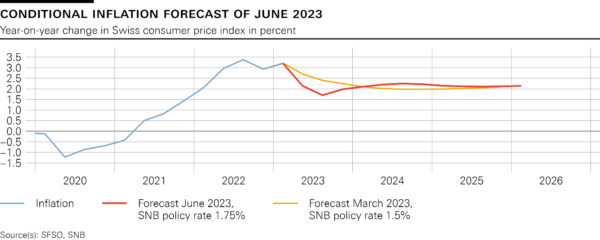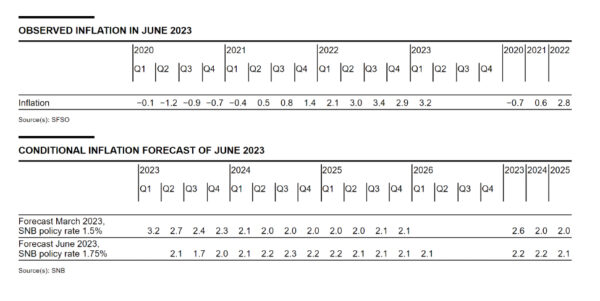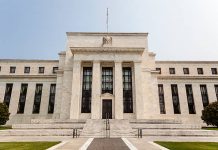The SNB is tightening its monetary policy further and is raising the SNB policy rate by 0.25 percentage points to 1.75%. In doing so, it is countering inflationary pressure, which has increased again over the medium term. It cannot be ruled out that additional rises in the SNB policy rate will be necessary to ensure price stability over the medium term. To provide appropriate monetary conditions, the SNB also remains willing to be active in the foreign exchange market as necessary. In the current environment, the focus is on selling foreign currency.
The SNB policy rate change applies from tomorrow, 23 June 2023. Banks’ sight deposits held at the SNB will be remunerated at the SNB policy rate of 1.75% up to a certain threshold. Sight deposits above this threshold will be remunerated at an interest rate of 1.25%, and thus still at a discount of 0.5 percentage points relative to the SNB policy rate.
Inflation has declined significantly in recent months, and stood at 2.2% in May. This decrease was above all attributable to lower inflation on imported goods, in particular lower prices for oil products and natural gas.
The new conditional inflation forecast is based on the assumption that the SNB policy rate is 1.75% over the entire forecast horizon (cf. chart 1). Through to the end of 2023, the new forecast is below that of March. The lower oil and gas prices and the stronger Swiss franc are having a dampening effect over the short term. From 2024 onwards, the new forecast is higher than in March, despite today’s increase in the SNB policy rate. The reasons for this are ongoing second-round effects, higher electricity prices and rents, and more persistent inflationary pressure from abroad. The new forecast puts average annual inflation at 2.2% for 2023 and 2024, and 2.1% for 2025 (cf. table 1). Without today’s policy rate increase, the inflation forecast would be even higher over the medium term.
Economic growth was modest in the advanced economies in the first quarter of 2023. Although inflation declined again in many countries, it remains clearly above central banks’ targets. Core inflation in particular is still stubbornly elevated. Against this background, numerous central banks have tightened their monetary policy further, albeit at a somewhat slower pace than in the previous quarters.
The growth outlook for the global economy in the coming quarters remains subdued. At the same time, inflation is likely to remain elevated worldwide for the time being. Over the medium term, however, it should return to more moderate levels, not least thanks to the more restrictive monetary policy and due to the economic slowdown.
This scenario for the global economy remains subject to large risks. In particular, the high level of inflation in some countries could be more persistent than expected. Equally, the energy situation in Europe could deteriorate again in Q4 2023 and Q1 2024.
Swiss GDP growth was solid in the first quarter of 2023. The services sector gained momentum, and there was also a slight increase in value added in manufacturing. The labour market remained robust, and overall production capacity has been well utilised.
However, the SNB expects modest growth for the remainder of the year. Subdued demand from abroad, the loss of purchasing power due to inflation, and more restrictive financial conditions are having a dampening effect. Overall, GDP is likely to grow by around 1% this year. In this environment, unemployment will probably rise slightly, and the utilisation of production capacity is likely to decline somewhat.
The forecast for Switzerland, as for the global economy, is subject to high uncertainty. The main risk is a more pronounced economic slowdown abroad.
As regards the real estate market, price growth for single-family houses and privately owned apartments has slowed in recent quarters, while prices for apartment buildings have declined. Mortgage growth has remained largely unchanged. The vulnerabilities on the mortgage and real estate markets persist.
















